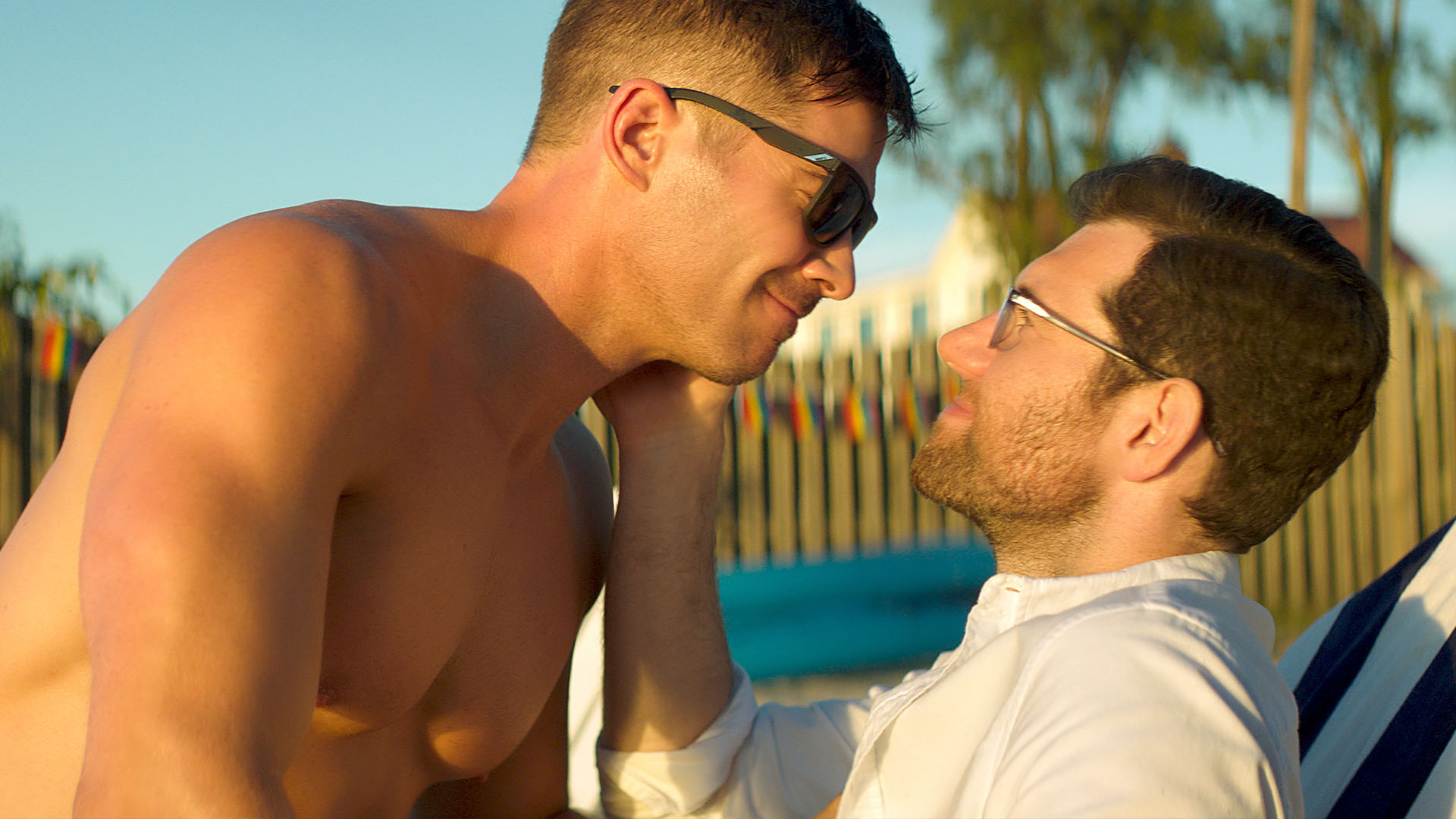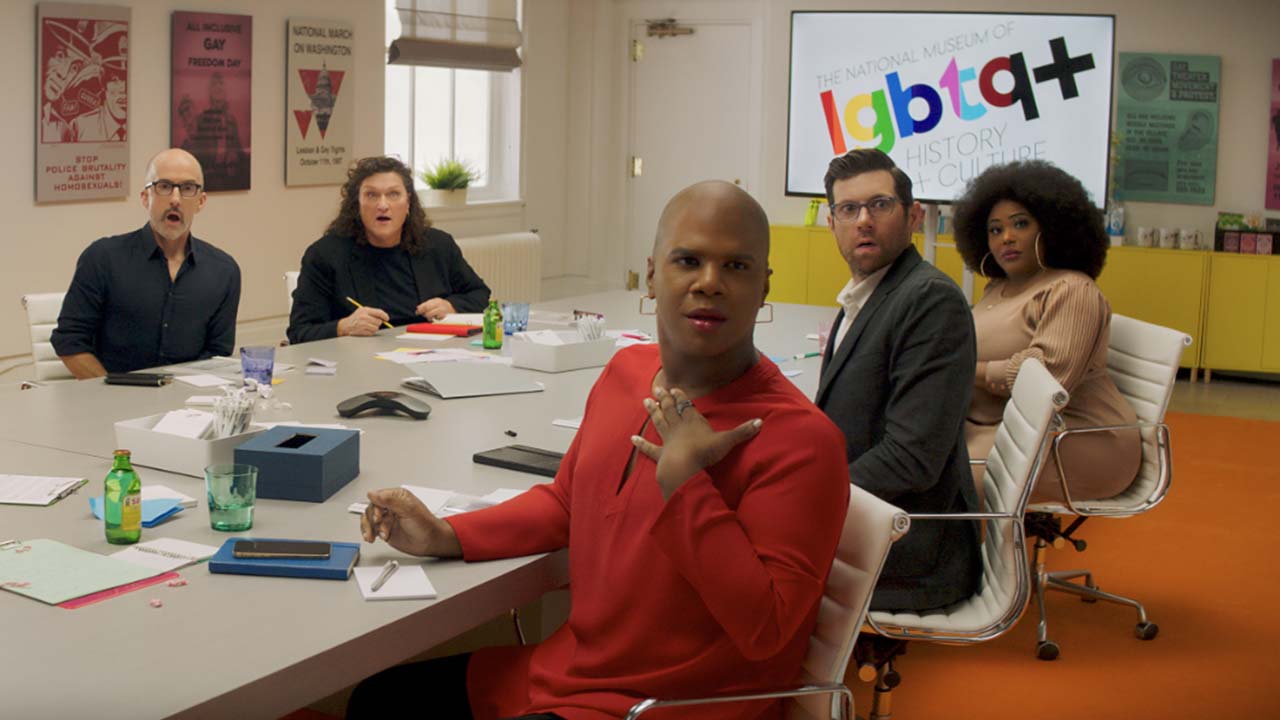There’s a lot of love in Bros, a rainbow-loving take on an old formula

Can two men with commitment problems attempt a long-term relationship? That’s the premise of Bros, a queer rom-com starring Billy Eichner and Luke McFarlane. The results are wildly funny and unapologetically sex-positive, writes Stephen A Russell.
“Love is not love… That’s bullshit.” Comedian Billy Eichner knows exactly what he’s doing when he opens his bid for mainstream box office dollars—Universal Studios-backed LGBTQI+ rom-com Bros—with a whip-smart scene upending expectations. Playing Bobby, a sassily self-conscious writer and queer historian, his character would never take on the task of the man playing him. When a well-meaning movie producer taps him to write a screenplay, Bobby insists he’s a 40-something single man with commitment issues who does not trust ‘the gays™’ and their sexually charged, oft non-monogamous relationships don’t look the same anyway.
Anyone familiar with Eichner’s celeb-perambulating YouTube series Billy on the Street, or his later-seasons turn in Parks and Rec, will be familiar with his motormouthed oversharing and surprisingly peppy brand of pessimism. Co-written with Bad Neighbours and Forgetting Sarah Marshall director Nicholas Stoller (who also directs here), Bros is a wildly funny and unapologetically sex-positive update on ’90s American queer indies like Eating Out for a more inclusive age. A subplot involving Bobby as the head of a planned LGBTQI+ history museum in New York City helps. And as saucy as the film can be, including no fewer than two raunchy orgy scenes, those seeking good old-fashioned romance in the Nora Ephron vein will not be disappointed either. Though top marks for comparing Meg Ryan’s late-night missives in You’ve Got Mail to the “Whassup… bottom?” dialogue more commonly unfolding on hook-up app Grindr.
Cupid’s arrow is pointed at Luke McFarlane of Brothers & Sisters fame. He plays super-buff probate lawyer and similarly romantically reticent Aaron, the ‘will they, won’t they, of course they will’ object of Bobby’s desire. They meet cute in a club seething with topless torsos (yes, Bros knowingly leans into stereotypical tropes and has a laugh unpicking them), the afterparty for the opening of a new app—Zellweger—for gay men who’d rather talk about actresses then go to bed solo. Which is almost as funny/sweet as Bobby’s line despairing at the youth of today: “It’s not fair. We had AIDS and they had Glee.”
Every rom-com lives or dies on the chemistry between its leads, and it’s safe to say that the dorky geek vs hot jock vibe is going off here. If an underdeveloped plotline involving Aaron’s steroid use doesn’t quite fly, then his frustration about being stuck in a miserable career and worries over whether his true passion is masculine enough rings much truer. Likewise, Bobby’s meltdown over constantly having to step over second-guessing himself when publishers, editors, directors and more tell him to tone down the G-A-Y, and in so doing appear way more self-confident than he actually is, is a sweet beat that many audience members will feel too keenly. It also sets up the inevitable second-act split that tips us into sweet kiss and make up territory of the finale.
The other key ingredient to a successful rom-com has always been the best friend factor. Here that role is ably dispersed—like a gang of lesbians wrangling Bobby’s freak-out in one scene.

With most of the cast played by out actors, The Mindy Project’s Guy Branum is great as Bobby’s bestie. As are the ensemble making up the queer history museum’s board, like Glee alum Dot-Marie Jones, who wants to emulate the Natural History Museum’s hanging whale but swap it out for Jodie Foster, and Zola actor TS Madison, who reminds us that as a black trans woman she has enough of a hard time constraining her anger without having to deal with Bobby’s shit. Jim Rash is also great as a constantly exasperated man fed up with bi-erasure, alongside Eve Lindley’s phone-attached “post-everything” millennial, and Miss Lawrence as the most chilled board member who’s all about “holding space” for everyone else.
Portraying the queer rainbow as basically a big family who—while they love each other dearly—fight tooth and nail on the regular, is pitch perfect. Eichner is gracious enough to know that the solidarity of occasionally fraught community is just as big an emotional pull here, if not more so, than two cis white guys inexorably falling for one another despite their best protestations. And yes, there are jokes about the central casting too.
Throw in a Christmas sequence replete with eye-wateringly funny Hallmark-like movies mercenarily cashing in on queer identity and you have a genuinely cracking film that’s an absurdly good time. Fire Island’s Bowen Yang steals the show as a rich museum donor who wants a gay trauma rollercoaster, literally, only to be trumped by none other than Debra Messing—eating the scenery as her queer iconic diva self in a running joke that hits like a dancefloor sniff of poppers. Trust us, you’ll want a whiff of this.




















